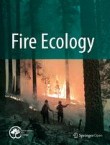2024 Outstanding Associate Editor

Dr. David L. Peterson, Professor of Forest Biology at the University of Washington, and Emeritus Senior Research Scientist with the USDA Forest Service, Pacific Northwest Research Station in Corvallis, Oregon, has conducted research on fire science and climate change throughout the western United States; and has published 280 scientific articles and 5 books on these topics. He was a contributing author for the Intergovernmental Panel on Climate Change and was co-lead for the Forests chapter of the Fourth National Climate Assessment. Prof. Peterson was formerly Editor-in-Chief for Northwest Science (Northwest Scientific Association), and served as Associate Editor for Ecological Applications (Wiley), Canadian Journal of Forest Science (Canadian Science Publishing), and Environmental Science and Policy (Elsevier). He currently works on climate change vulnerability assessments and adaptation on federal lands in the western United States in association with the USDA Northwest Climate Hub and the Western Wildland Environmental Threat Assessment Center. Prof. Peterson lives on Mountain Heart Tree Farm in northwest Washington, where he has planted 3000 native trees and cultivates bonsai, epiphyllums, and a variety of vegetables, fruits, and flowers.
Editor's Note: Dave has been a major rock on our editorial mountain since Fire Ecology's inception. He has taken the most contentious and ground-breaking papers and lead the review of these papers with objectivity and professionalism. Dave has also stepped in and taken over the AE role on nearly all our major emergencies. His reviews are of the highest quality, they are done quickly and without snags. Thank you, Dave, for all the work you have done for Fire Ecology throughout your career.
2024 Journal Service Award

Dr. Karen C. Short, Research Ecologist at the USDA Forest Service, Rocky Mountain Research Station located at the Missoula Fire Sciences Laboratory, Montana, began her career in wildland fire science studying the effects of prescribed burns in southwestern national parks. Her current research is focused on wildfire risk assessment and mitigation efforts at national and regional scales. To support that work, Dr. Short has developed and maintains several fundamental wildfire activity datasets and is a member of an informal confederation of interagency teams working to improve the availability and quality of wildland fire data for research and fire management applications.
Editor's Note: Karen volunteered to be an editor for a special collection in Fire Ecology. Unbeknownst to her, most of the papers in that collection were written by authors who were also editors of the collection. As a result, Karen was assigned eight articles over the last two years and, at one time, she was working on five articles simultaneously–a new record for Fire Ecology. We thank her for the service above and beyond the call.
